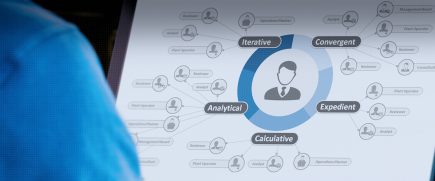An important element of a designer’s life is to constantly think about innovative workarounds to challenges their customers face. Design thinking here is not just a methodology but an entire attitude of shifting our focus from reacting to constructive and collaborative responsiveness.
In times when Global Inc. is reconsidering how to reorganize work in the midst of a pandemic, we get together and look at empowering our teams through the digital, re-emphasizing what we believe in the most – Empathy, Innovation, and Collaboration. But remotely!
Hari Nallan & Mohita Jaiswal - March 2020

Living the life of a virtual designer
Designers stay hand-in-glove with a plethora of digital tools to deliver what is required for meeting the clients’ needs. Considering synchronicity of tools becomes important in scenarios when both collaborative work and coordinated work needs to be executed, at different points in time. To manage remote teams, solutions can either allow everyone to work together simultaneously (Synchronous tools) or provides space for people to contribute individually in their own time (Asynchronous tools).
Empathizing with the challenges of the designer in the context of remote working is the first step to understand what is required for them to create in this new scenario.
How can work be planned and managed remotely?
There are many essential tools designers can use to manage design projects remotely. Innovation lies in setting the right processes around these tools which are most optimal both in terms of synchronicity needs (do we need an activity to be done quickly together or a quick output is not necessary) and also within the budgetary constraints. We share a ready reckoner of various intuitive and collaborative tools as a bucket list into your venture of innovative remote working together.
Design has always been a precursor to something larger. Leveraging digital tools for Design signals the dawn of a new era of collaboration, free of barriers. I see a revolution in the making.
1. Brainstorming
Organizing, summarizing and visualizing information can allow the discovery of connections and interrelationships between information or ideas. These set of tools are helpful to solve problems, ideate and uncover new ideas and map out resources.
- Virtual boards: Google Docs, IdeaBoard, Realtimeboard, Google Sheets, Sketchboard
- Mind Mapping Tools: MindMeister, XMind, Coggle

2. Designing
There are many challenges one solves in a design workflow. Tools for rapid prototyping, responsive and collaborative design, wireframing, creating animations, working with design systems abound both as standalone tools and comprehensive frameworks. Real-time collaboration and possibilities of co-editing on each of these tools is a useful element to work together remotely and iterate through feedback.
- UI Design Tools: InVision Studio, Sketch, Adobe Creative Cloud, Zeplin, Marvel, Figma
3. Managing
Team coordination and building accountability is an important prerequisite for ensuring the progress of work happens smoothly and within deadlines committed. In remote work, the following tools become crucial for managers to plan and manage projects in the absence of visibility of team actions.
- Scheduling and Planning tools: Team Gantt,Google Sheets, Float, Monday
- Project management tools: Basecamp, Trello, Asana, Slack
4. Aligning
Meetings are essential to align with one another and share information, status, and ideas. In remote settings, running effective meetings and sharing ideas powerfully requires technology which can optimize collective time, enable engagement, encourage participation and ensure immersion (through audio/video capabilities).
- Video conferencing: Zoom, Google Hangouts, Microsoft Teams, Webex, Google Meet, Prysm
- Presentation tools: Powerpoint Online, Google Slides, Keynote, Prezi, LinkedInShare

Accentuating Collaboration in the times of Social Distancing
Leaders around the world are investing in digital technologies to ensure a smooth continuation in business operations but do also need to facilitate, inspire and build in a culture of learning for the same.
As the global workforce prepares itself to work from home, effective digital communication would become a catalyst in keeping our linkages strong, the essence of collaborating as a community alive. We would need to reassess our competencies to thrive in a virtual work environment giving priority to strong communication skills, self-direction, emotional intelligence, and openness to new technology.
What seems to be daunting and isolating as a circumstance, can stand to knit us together as a community, with our collective resilience and initiative.




